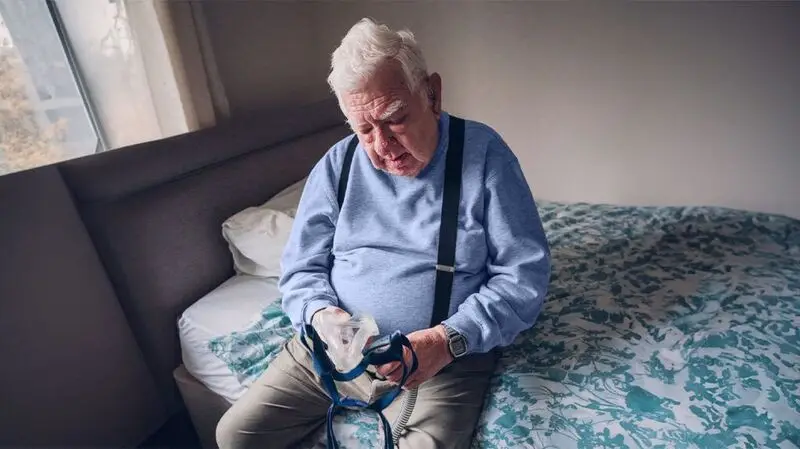
- Obstructive sleep apnea (OSA) affects 936 million adults worldwide and may raise the risk for several neurological conditions, including Alzheimer’s.
- Researchers from the University of California, Irvine have found that sleep apnea severity during the REM stage of sleep negatively impacts verbal memory.
- The negative impact is especially high in older adults at risk for Alzheimer’s, the researchers report.
Researchers estimate about 936 million adults globally live with obstructive sleep apnea (OSA) — a condition where a person has interruptions, or pauses, in breathing when sleeping, causing disrupted sleep.
Past studies have linked OSA to a heightened risk for several neurological conditions, including
Now, researchers from the University of California, Irvine have found that sleep apnea severity during the rapid eye movement (REM) stage of sleep negatively impacts
The study was recently published in the journal
For this study, researchers focused on verbal memory.
“Verbal memory is the ability to remember words in the appropriate context,” Bryce A. Mander, PhD, associate professor in the Department of Psychiatry and Human Behavior at the University of California, Irvine, and co-corresponding author of this study explained to Medical News Today.
“Remembering the names of streets at an intersection associated with a memory, or someone’s name, or how words are paired together are some examples of verbal memory.”
“Verbal memory is particularly vulnerable to Alzheimer’s disease and is one of the earliest forms of memory to be impacted by Alzheimer’s disease biomarkers,” Mander added.
“We studied this form of memory because of its vulnerability to decline with aging and Alzheimer’s disease.”
Mander and his team recruited 81 adults with an average age of about 62 and about 70% having a parental history of Alzheimer’s disease. The group was also 62% female participants.
All study participants participated in verbal memory assessments and polysomnography — a diagnostic tool for sleep disorders.
At the study’s conclusion, scientists found that sleep apnea events occurring during REM sleep negatively impact a person’s verbal memory, especially in participants with a
“We initially predicted events in
“However, we think these REM findings make sense because REM sleep also can support memory and it is a brain state that has a higher metabolic demand than NREM sleep and, in some memory-relevant brain areas, even higher than during wakefulness.”
“If you are starving your brain of oxygen during a brain state with higher metabolic demand, you may be more likely to get brain damage,” Mander added. “We think this is possibly the case and are examining this in our next studies.”
Mander said these findings underscore the impact that sleep apnea events can have when they occur during REM sleep.
“They have often been dismissed clinically, in favor of global sleep apnea metrics that have historically been poor at predicting cognitive and health outcomes,” he continued.
“These findings support the idea that looking at the brain state you experience sleep apnea in will offer a greater understanding of the cognitive consequences of sleep apnea.”
“We also think this might highlight the importance of focusing on how we quantify the severity of sleep apnea in our examination of the Health and neurodegenerative consequences of Alzheimer’s disease, as well as how we may target sleep apnea treatment to minimize the cognitive consequences of Alzheimer’s disease.
OSA is a known Alzheimer’s disease risk factor, but it has not been clear which aspects of sleep apnea are most relevant for cognitive impairment associated with Alzheimer’s disease risk. Identifying these specific links is crucial to understanding why sleep apnea is relevant for dementia risk and how treatments can be tailored to target the mechanisms of this association.”
— Bryce A. Mander, PhD, co-corresponding study author
After reviewing this study, Adrian Pristas, MD, sleep medicine specialist and pulmonologist at Jersey Shore University Medical Center and corporate medical director of the Hackensack Meridian Centers For Sleep Medicine in New Jersey, told MNT that this research provides more understanding of the consequences of untreated sleep apnea — and any measure of poor sleep for that matter — on our health and specifically the adverse effects on cognitive well-being.
As more research is completed and shared, it is clear our brain suffers from OSA as well as
“In general, the vast majority of adults with OSA are not identified and treated. There is a great opportunity for the medical community to positively change the trajectory for many of these patients.”
“The medical community, as well as the public, will need to accept the importance of all aspects of sleep health. This is an opportunity to make remarkable changes in population health. Specifically for those with Alzheimer’s disease, sleep testing must be part of the initial evaluation.”
— Adrian Pristas, MD, sleep medicine specialist, pulmonologist
MNT also spoke with Clifford Segil, DO, a neurologist at Providence Saint John’s Health Center in Santa Monica, CA, about this study.
Segil said it was fascinating to read a study looking at certain types of problems sleeping to see if a breathing problem during the dreaming part of sleep or sleep apnea severity during REM sleep can cause problems with verbal memory.
“As the authors noted the underlying mechanism for their study’s observations remains unclear — it is also true why we dream and have REM sleep also remains unclear in 2024,” he continued.
“I was surprised to see gender and age alongside parental history and a genetic marker for dementia being evaluated as gender and age may not be accepted risk factors for dementia, while parental dementia history and
“I would (like) the authors of this study to propose a mechanism of action of why REM sleep is Healthy before postulating why a change to it can be unHealthy. If we don’t know the purpose of Healthy REM it is extremely challenging to assign a pathological condition to unHealthy REM sleep.”
— Clifford Segil, DO, neurologist





